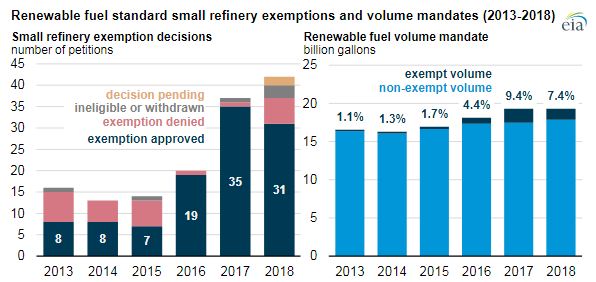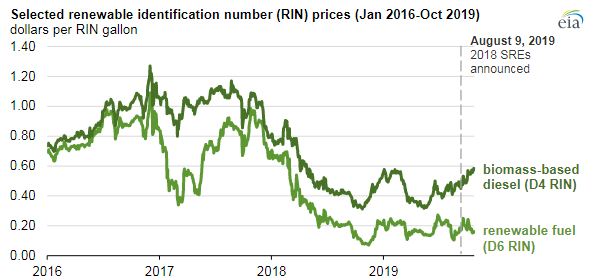As of October 2019, two SRE applications were pending. The SRE waivers effectively reduced the amount of biofuel required to enter the nation’s fuel supply by exempting 7.4% of the total RFS renewable fuel volume mandate for the 2018 compliance year, or about 1.43 billion gallons.
The RFS sets annual targets for the amount of renewable fuels required to enter into the US fuel supply to increase biofuels use. Obligated parties – petroleum refiners and importers of motor gasoline and diesel – comply by either blending biofuels into petroleum-based fuels or by purchasing credits known as renewable identification numbers, or RINs.

Source: US Energy Information Administration, based on US Environmental Protection Agency's Moderated Transaction System
Through 2010, Clean Air Act provisions exempted small petroleum refineries – defined as those with average crude oil inputs no greater than 75,000 barrels per day –from complying with the RFS. In the 2011 and 2012 compliance years, the EPA extended these exemptions to 24 small refineries. Beginning in 2013, however, small refineries have had to annually petition the EPA for individual exemptions. To receive an exemption, a refinery has to prove disproportionate economic hardship as defined by the Clean Air Act.
For compliance years 2013 through 2015, the EPA approved fewer than 10 SRE petitions per year. Nearly as many exemption requests were denied in those years. The EPA approved nearly 20 exemptions for the 2016 compliance year and approved more than 30 exemptions for the 2017 and 2018 compliance years combined. SRE waiver approvals have increased the number of carryover RINs that are available for use in subsequent compliance years.
For 2018, the EPA set the total renewable fuel mandate at 19.29 billion gallons. The 31 SRE waivers equate to 1.43 billion ethanol-equivalent gallons, or 7.4% of the total renewable volume obligation (RVO) for the 2018 compliance year. In total, these waivers exempted about 13.4 billion gallons of gasoline and diesel from compliance with the RFS programme.
Exemptions for small refineries are typically approved after a RFS compliance year ends. However, on 15 October 2019, the EPA issued a supplemental notice of proposed rulemaking seeking comment on offsetting a portion of SRE waivers for the 2020 compliance year. In it, the EPA outlined a plan to project the volume of exempt gasoline and diesel from SREs when setting annual renewable fuel percentage standards.

Source: US Energy Information Administration, based on IHS Markit. Note: RIN prices vintage corresponds to calendar years.
Since late 2017, RIN prices have generally trended downward. Renewable fuel D6 RIN prices, which averaged about $0.75/gal in 2016 and 2017, have averaged about $0.30/gal in 2018 and less than $0.20/gal so far in 2019. Similarly, D4 RIN prices averaged nearly $1.00/gal in 2016 and 2017 before falling to an average of about $0.55/gal in 2018 and $0.45/gal so far in 2019.
Source: US Energy Information Administration












